Search results
Black Sheep Ancestors
May 11, 2012 by ramona
Filed under Articles, Genealogy Research Resources, Latest News, Sharing Genealogy Information
 Pirates, Outlaws and Ne’er do wells; it would be uncommon to research any family tree without finding at least one skeleton in the closet.
Pirates, Outlaws and Ne’er do wells; it would be uncommon to research any family tree without finding at least one skeleton in the closet.
Ancestors with a criminal record can range from unfortunate debtors who paid a price for being poor to thieves and pickpockets or even those executed for murder. Although none of us wants to find we descended from a cold-blooded killer, having a rogue in the family tree does add a little excitement.
Throughout history there have been criminals and alongside them court systems and institutions for dealing with them. With prisons and courts come the records they generate and those records are a wonderful resource for genealogists and family historians looking for a missing ancestor.
Information found in court and prison records can include the accused or inmate’s next of kin, name and age. Whether or not they could read, their trade, the reason they were in trouble and the sentence they received for their crime.
Finding Criminals Past
Blacksheep Ancestors is a free genealogy site filled with prison lists and court records that encompass Great Britain, Canada and the US.
One fantastic and free searchable list is The Proceedings of the Old Bailey, 1674-1913, which has a fully searchable database that contains 197,745 criminal trials from London’s central criminal court.
The site also has links to the biographies of petty and master criminals alike where you can read the stories about:
- Catherine Hayes, who in 1725 conspired with her lovers to kill her husband and was tried, convicted and executed for her crime.
- The Fourth Earl Shirley, Laurence Ferrers, who was the last peer of the realm convicted as a common criminal and hanged
- Eliza Fenning, a young cook who was found guilty of the attempted murder of her employers by poisoning their food. Up until the moment Eliza was put to death, she claimed her innocence.
Whether you have an ancestor who was a minor miscreant or someone with an infamous criminal past, Blacksheep Ancestors is a fascinating genealogy website dedicated to helping you trace the romantic rogues and villainous scoundrels in your ancestral line. Share your Black sheep story on Genealogy in General.
Genealogy Quotes: In the Words of our Ancestors
May 8, 2012 by ramona
Filed under Articles, Family History, Latest News
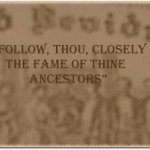
Family name, lineage, bloodline, pedigree, family tree and genealogy are all words that resound with a wish to be remembered and a desire to honor our forebears.
Our desire to celebrate our ancestors has possibly been around as long as we have and so have genealogy quotes, proverbs and sayings.
From the “begats” of the Christian bible that trace the lineage of Jesus, to the significance of “Word Fame” to the Vikings. The importance placed on our family trees is reflected in proverb, archaic literature and the current popularity of websites dedicated to genealogy quotes. Just type the phrase “Genealogy Quotes” into Google and you will come up with 11,600,000 results.
Wise words such as this ancient Gaelic proverb:
“Follow, thou, closely the fame of thine ancestors” (lean-sa dlùth ri cliù do shìnnsear) is perhaps one of the oldest recorded Western European genealogy quotes and one that continues to inspire family history hunters.
If you are in need of some inspiration or just love to reflect on the words of wisdom left by past generations – about past generations. You are going to love Genealogy Beginner’s list of :
Genealogy Quotes: In the Words of our Ancestors
“Distinguished ancestors shed a powerful light on their descendants, and forbid the concealment either of their merits or of their demerits”
Gaius Sallustius Crispus (86 BC – 35 BC)
“He who boasts of his ancestry praises the merits of another”
Seneca (4 BC – 65 AD)
“It is indeed a desirable thing to be well descended, but the glory belongs to our ancestors”
Plutarch (45–120 CE)
“To forget one’s ancestor’s is to be a brook without a source, a tree without root”
Chinese Proverb
“The mark of a Scot of all classes [is that] he … remembers and cherishes the memory of his forebears, good or bad; and there burns alive in him a sense of identity with the dead even to the twentieth generation.”
Robert Louis Stevenson (1850-1894)
“Cattle die, kinsmen die, one day you yourself shall die, but the reputation of the dead never dies.”
Havamal
“He who has no fools, knaves, or beggars in his family was begot by a flash of lightning”
Old English Proverb
“We need to haunt the house of history and listen anew to the ancestors’ wisdom”
Maya Angelou
“People will not look forward to posterity, who never look backward to their ancestors.”
Edmund Burke (1729-1797)
Feeling inspired? If you want to learn genealogy start with Genealogy Beginner
Global Adoptee Genealogy Project
May 6, 2012 by ramona
Filed under Articles, Genealogy groups, societies and organizations, Genealogy Research Resources, Latest News
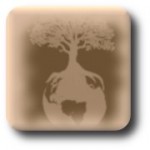 The world of genealogy is ever evolving; every day there is word of a new group or project on the horizon that promises to enrich the global genealogy community. As a genealogist who is also an adoptee, I am always excited to hear about groups like The Mixed Roots Foundation and their Global Adoptee Genealogy Project.
The world of genealogy is ever evolving; every day there is word of a new group or project on the horizon that promises to enrich the global genealogy community. As a genealogist who is also an adoptee, I am always excited to hear about groups like The Mixed Roots Foundation and their Global Adoptee Genealogy Project.
Today in the United States 6 in every 10 people are touched by adoption.
The Mixed Roots Foundation is the first ever-registered charity set up to aid adoptees in finding their genetic roots. The charity, whose board members are all adoptees, has made it their mission to support those individuals adopted and fostered, by raising awareness of the adoption experience.
Among the goals of the Mixed Roots Foundation is the mission to provide more post adoption resources for adoptees and their families. This includes a project geared to help adoptees trace their family tree. The project that directly addresses this is the Global Adoptee Genealogy Project (GAGP).
Global Adoptee Genealogy Project
The Global Adoptee genealogy Project is looking to answer the questions.
“Who are you? What are you? and Where are you?”
The aim of this project is to aid adoptees in learning more about their genetic and cultural roots. In an effort to achieve this goal they are partnering with the DNA testing facilities 23andME and Family Tree DNA. The foundation will also be recruiting adoptees and their families for participation in the project and through the Filling in the Gap Fund, they will be providing funds to offset the costs of DNA testing for adoptees in need of financial assistance.
Bennett Greenspan, president of Family Tree DNA has this to say about the project.
“As an evangelist for genetic genealogy, I encounter adoptees all the time. They want this and, more importantly, they need GAGP. Adoptees have a thirst to know who they are, what they are and why they were adopted. DNA testing offers potential answers to two of those three questions. We hope that as the database grows, more and more matches will be made.”
One of the project supporters, The Evan B. Donaldson Adoption Institute, (a national leader in adoption-related research, education and advocacy) will be playing a large role in efforts to reach the adoption community and get the word out about GAGP.
Executive Director, Adam Pertman states, “The Mixed Roots Foundation is doing something genuinely important, with real scope and vision, and with the promise of impacting many, many lives in a positive way,” Peterman also says, “We know, from both research and experience, that access to one’s own information is a vital part of life, including shaping a positive identity. This project will go a long way toward giving adopted people the tools and knowledge to start putting together the pieces of their own puzzles. It’s purely wonderful.”
The project launch is set for Monday May 21, 2012 at the Punch Line Comedy Club in San Francisco, CA. A portion of proceeds from this fundraiser will go to the Filling in the GAGP Fund. Additionally DNA testing partners have donated testing kits as raffle prizes.
For more information about Global Adoptee Genealogy Project and The Mixed Roots Foundation, join us on the Genealogy in General forum.
Deep Ancestry and a Rediscovered Scottish Tribe
May 1, 2012 by ramona
Filed under Articles, Genealogy Technology, Introduction to Genealogy, Latest News
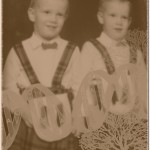 Have you heard the term “Deep Ancestry” a process that uses both mtDNA and Y-DNA to find the most ancient roots on your family tree?
Have you heard the term “Deep Ancestry” a process that uses both mtDNA and Y-DNA to find the most ancient roots on your family tree?
This week Scotland’s DNA Project has come forward with some groundbreaking results using this process. Population Geneticist Dr. Jim Wilson of Edinburgh University along with journalist Alistair Moffat reported that the project has found one of Scotland’s long lost tribes.
The tribe called the Maeatae lived about 208 AD in the area around Stirling. History documents them in the works of the Roman writer Dio Cassius who recorded them as a hostile tribe living close to the Antonine Wall and in Adomnán’s Life of Columba (Saint Adomnán of Iona (627/8 – 704)). All references to the tribe disappeared after the 8th century…until now.
Moffat best known for his book The Scots: A Genetic Journey states “When the great Roman emperor Septimius Severus invaded Scotland with the largest army ever seen north of the Tweed, 40,000 legionaries and auxiliaries and a supporting fleet, he fought the Maeatae. They were mentioned by Roman historians as a fierce people and much later, noted by Adomnan, the biographer of St Columba. And then they disappeared from history,” Moffat goes on to say, “Now they are found. DNA has uncovered a high concentration of a distinctive marker clustered around Stirling and the foothills of the Ochils – the homeland of the fierce Maeatae. These are stories only DNA can tell.”
Other results from this study include:
- Nearly 100 distinctive Y-DNA groups have been found thus far
- One percent of Scottish men are descended from Tuareg and Berber Tribesmen of the Sahara
- The basic lineages of Scotland and England are similar
- Actor Tom Conti is a descendant of Napoleon Bonaparte
Test participants paid around 170 pound to have their DNA tested. From these, lineages were discovered for one Viking, one Arab, a Hebridean and three Saxons.
The future of the project promises even more excitement as Dr. Wilson reveals that they will be looking even closer at Neanderthal DNA in Scotland.
Finding the Living with Megan Smolenyak
April 29, 2012 by ramona
Filed under Articles, Latest News
 You may have see genealogist Megan Smolenyak on Good Morning America or the Today Show. You may be more familiar with her from her books, her work with popular genealogy programming or from her numerous speaking engagements.
You may have see genealogist Megan Smolenyak on Good Morning America or the Today Show. You may be more familiar with her from her books, her work with popular genealogy programming or from her numerous speaking engagements.
From her dedication in finding the family of soldiers who are unaccounted for from past conflicts, (as a consultant with the U.S. Army), to her work as an outspoken advocate of using DNA to trace your roots Ms. Smolenyak is definitely a genealogist on a mission.
If you are a fan you will not want to miss the opportunity to view her very first webinar “Reverse genealogy: Finding the Living”. Even better, you can view it free up until May 7, at Legacy Family Tree.
Reverse Genealogy
So what is reverse genealogy? In a nutshell, it is taking information discovered about your ancestors and using it to move forward in time in order to find living relatives.
The Webinar begins with an informative questionnaire that lists why people want to find the living.
The top two reasons:
– To find living cousins
– To solve mysteries using DNA
In order to “find the living” Smolenyak uses two methods that she describes as
- Broadcasting, a method that incorporates the use of message boards and Social Networking to make it easy for people you are looking for to find you.
- Seeking, an aggressive research method where you actively work to seek out individuals with common ancestors.
In her webinar you will learn about some fantastic resources, research guidelines and strategies that will help you to conduct an effective cousin search in addition to some great tips on how to approach your long lost relatives once you have found them.
If you want to start a reverse genealogy project, you will not want to miss this chance to learn from a pro. Join us on the Genealogy News and Events forum for a direct link to the webinar.
Why Learn Genealogy?
April 27, 2012 by ramona
Filed under Articles, Getting Started in Genealogy, Introduction to Genealogy, Latest News
 Have you ever wondered why genealogy and family history research is so popular? What is it that drives people to spend so much of their money and time pursuing their ancestral past?
Have you ever wondered why genealogy and family history research is so popular? What is it that drives people to spend so much of their money and time pursuing their ancestral past?
On a personal level it may start with a question of self-identity “Who am I?” or a need to know where we belong “Where do I come from?”
In 1964 psychologist H. J. Sants, coined the term “Genealogical Bewilderment” in describing identity issues in adoptees, Sants theory declared that adopted children experienced a greater degree of stress than children raised by their genetic parents due to an absence of knowledge of their origins.
In 1952 a letter was written to the Journal of Mental Health by psychiatrist E. Wellisch, titled “Children without genealogy: The problem of adoption” in which he said:
“Knowledge of and definite relationship to his genealogy is … necessary for a child to build up his complete body image and world picture. It is an inalienable and entitled right of every person. There is an urge, a call, in everybody to follow and fulfill the tradition of his family, race, nation, and the religious community into which he was born. The loss of this tradition is a deprivation which may result in the stunting of emotional development.”
While not everyone who engages in genealogy as a hobby is suffering from an identity crisis, there is still an echo of truth in these words.
Perhaps we feel a little disengaged from the far off shores of our homelands or maybe the answer lies in the theory of ancestral memory as expressed by Carl Jung’s “collective unconscious”, Freud’s “archaic remnants” or the more modern idea of “genetic memory”. All theories which at their heart suggest that within each individual is a body of knowledge or a memory passed down through our ancestors.
Speculation and pseudoscience aside there is no doubt that genealogy has become a popular hobby. The most current report on market trends for genealogy by Global Industry Analysts, Inc. (statistics as of January 11, 2012) show that between US$1000 to US$18000 is spent per year on genealogy research by over 84 million genealogists.
Ultimately, the why of genealogy research can only be answered by the individual pursuing it and perhaps it is best left at that. However, one thing all of us addicted to climbing our family trees can agree on is that it is one of the most rewarding hobbies around.
If you are ready to begin learning about your family tree start here at Genealogy Beginner.
The Language of Genealogy: Understanding Old Documents
April 24, 2012 by ramona
Filed under Articles, Getting Started in Genealogy, Introduction to Genealogy, Latest News
 Today’s language is quite different from the daily language of our ancestors. Some words and their meanings have all but disappeared from the modern lexicon.
Today’s language is quite different from the daily language of our ancestors. Some words and their meanings have all but disappeared from the modern lexicon.
For the Genealogy Beginner this can make reading old documents confusing if not outright frustrating.
Archaic Genealogical References
Recently I was assisting a novice genealogist in transcribing a document from the 1600s that they had been working on for some time. A huge part of the problem they were facing stemmed from an unfamiliarity of the language of the times. To make it worse the unfamiliar words were written in an abbreviated form of the times.
Transcribing old documents can be difficult enough on its own. The addition of archaic words and abbreviations that have no meaning in modern language simply makes the process nearly impossible; especially while simultaneously struggling with a old script in an aged document.
In this case, the words that were causing the problem were “Umqhuille”, “Relict” and “Milner”. Umqhuille is a word meaning deceased and Relict means Widow.
Milner in this time was a merchant who dealt in small, fancy goods. While the modern meaning of the word has changed to mean a seller of hats, the etymology of the word derives from Milan, from where many of these goods were once imported.
From working out the words, we were able to:
- Asses that the ancestor in question was deceased at the time of a particular baptism
- Recognize that one person on the document –Relict – was his wife
- Understand what his profession was
From this information, we added an additional generation to the family tree as the Umqhulille and relict named were the grand parents of the individual being baptized. This transcription also helped track down both a Will and a Sassine, which led to a great deal more information on the family researched.
This purpose of this little story is to demonstrate the importance of becoming familiar with the language of our ancestors. It is more than likely that novice Family tree hunters will run across some common and not-so-common old words while digging for their roots. For this, A genealogical dictionary would be a very helpful tool to have on hand.
Join us on the Ask a Genealogist Forum for a list of links to some excellent resources for archaic words, old occupations, medical terms and more.
Genealogy Scams and Red Flags
April 22, 2012 by ramona
Filed under Articles, Getting Started in Genealogy, Introduction to Genealogy, Latest News
 With the growing popularity of genealogy and family history, it is easy to find hundreds of internet sites dedicated to the subject; from sites claiming to have huge databases to others that promise to contain information relevant and specific to your family tree, surname or coat of arms.
With the growing popularity of genealogy and family history, it is easy to find hundreds of internet sites dedicated to the subject; from sites claiming to have huge databases to others that promise to contain information relevant and specific to your family tree, surname or coat of arms.
Beginning Genealogists should be aware that not every genealogy site is as good as the claims they make.
Genealogy Scams
While a great deal of family tree sites are trustworthy, newcomers to genealogy can sometimes fall prey to less reputable sites that exist to take your money and offer you zero results or results you could have found for free. Additionally family tree research novices should beware of “genealogy sites” that exist for the sole intention of gathering your personal information for the purpose of email marketing or worse…identity theft.
Before you enter your details for any family tree site, research the site to see what they are claiming to offer.
A reputable genealogy site will:
- List exactly the information, records and databases you can access once you have signed up
- State the locations and periods for which records are available
- State the source of the records or information they hold
Top Three Genealogy Site Red Flags:
#1. A site that makes generalized claims such as “Largest Genealogy Database”, “Millions of Names Free”, “Your Family Story” or simpler claims to “marriage or birth records” without any detail provided…should be avoided.
#2. Your “Free Search” results are ambiguous. For example, a search return that says they have found X-number of results on the name you entered without details. A good test of this kind of result is to type in a nonsense name such as Harry I. Balls or Jemima Pancakes to see how many results you get.
#3. A site that only provides an online contact form and does not list contact information such as a telephone number or address is not a good bet. A site without customer service is an absolute no go.
Although there are no 100%, fail-safes as these sites tend to come and go rather quickly. Following the above mentioned simple precautions may help you spot Red flags and make adding those names to your family template a safe and enjoyable experience.
1940s Census Sees Overwhelming Support from Volunteer Indexers
April 19, 2012 by ramona
Filed under Articles, Latest News
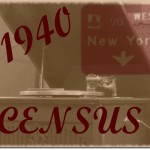
The genealogy community is alive with the spirit of giving and sharing as can be seen by the overwhelming efforts of volunteer indexers. As of April 20, 2012, the 1940’s Census Project has over 75,820 indexers.
Since the release of the census on April 2nd:
- So far, 14.2% has been completely indexed
- Colorado and Kansas have been completely indexed and are being processed in preparation for posting
- Delaware is posted online
- Nine states are 80% or more indexed and will soon be complete
Thanks to the extraordinary efforts of volunteer indexers, Family Tree buffs will soon be filling out their family Tree template with the census information of their recent ancestors who were living in the United States in 1940.
Family search promises to keep all of us updated every few days with their progress, check with them regularly to find the release date for your state of interest. For genealogists eagerly awaiting records for specific states here is a list of states that have been posted to date:
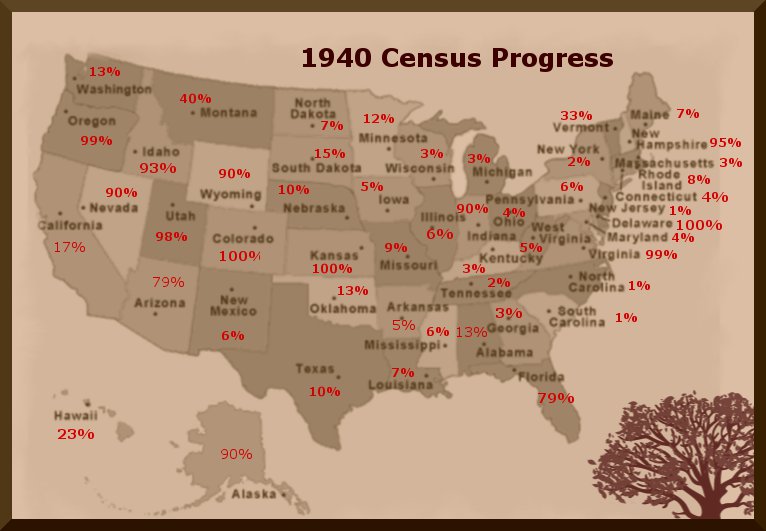
Genealogy Beginner thanks and congratulates all of the volunteer indexers for their heroic efforts. This is quite an accomplishment for the first week of indexing.
A Graphic Family in History
April 16, 2012 by ramona
Filed under Articles, Family History, Latest News, Preserving Your Family Tree
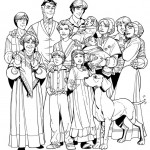 Family History books come in all shapes and sizes however I am not sure many genealogists ever expected to see one in the form of a graphic novel. The Loxleys and the War of 1812 is a book that records a monumental chapter in Canadian history through the premise of a family history.
Family History books come in all shapes and sizes however I am not sure many genealogists ever expected to see one in the form of a graphic novel. The Loxleys and the War of 1812 is a book that records a monumental chapter in Canadian history through the premise of a family history.
The idea to use a family tree to tell the story of the War of 1812 belongs to British expat, Alexander Finbow. Digging deep into letters and journals, Finbow researched families living in Upper Canada during this period in history. However, unable to settle on a single family the “Loxley’s” became a fusion of stories from several pioneering families.
The graphic novel is a factual telling of the war through the “Loxleys” a fourth generation Canadian family who are located in the Niagara Peninsula. Having left America following the American War of Independence, readers follow the family through the journals of “Aurora Loxley” who diligently records the involvement, trials and struggles of her family as they are thrust back into violence when America declares war on Britain and the Canadas.
A collaboration of artists, writers and historians The Loxleys and the War of 1812 is published by Renegade Arts Entertainment, written by Alan Grant with a summary by Canadian Military historian Mark Zuehlke, with illustrations by Claude St. Aubin and Lovern Kindzierski.
Although genealogically the story is indeed fictional, the concept of bringing a family history book to life through a graphic novel is intriguing and promises to be an enjoyable read for all interested in history and genealogy.
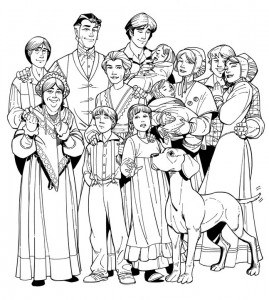
Image Courtesy of Claude St. Aubin with permission from Alexander Finbow
